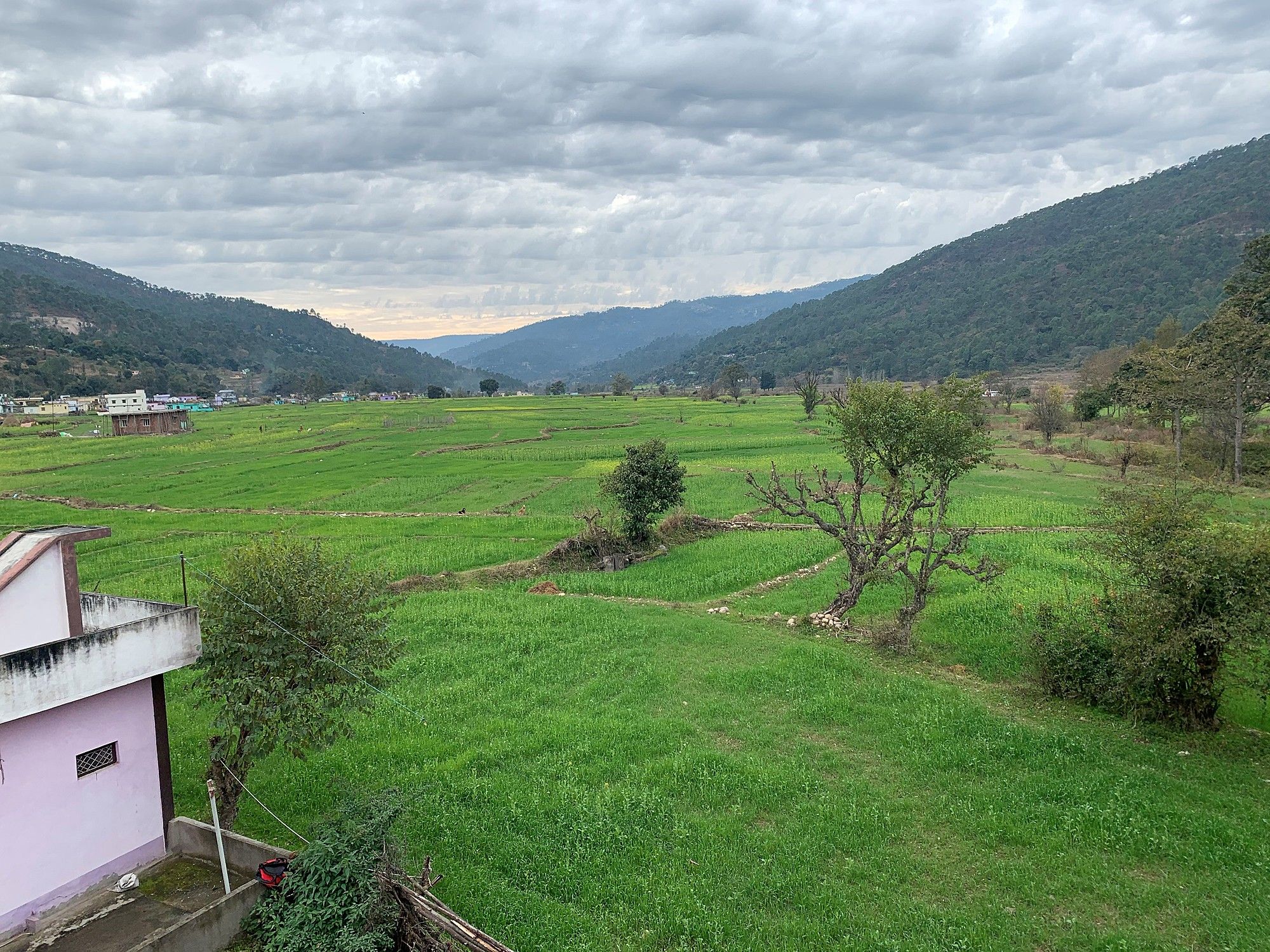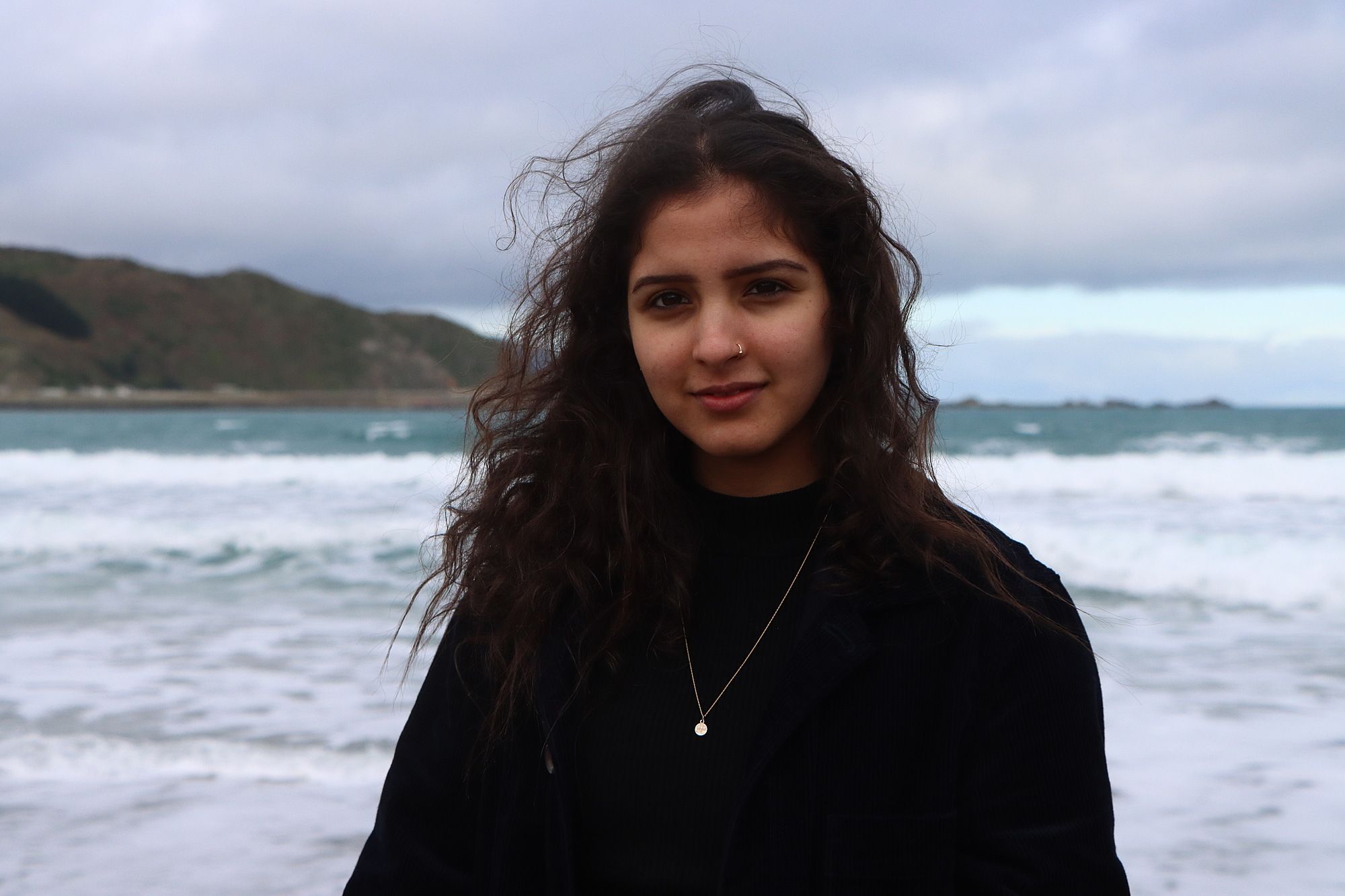Where the Oceans Meet
In this poetic essay, Kamla Waila gives up trying to be white and embraces her Indian culture.
‘Who We Are Now’ is a series of first-person essays on aspects of life in Aotearoa in the present moment, supported by a Copyright Licensing New Zealand Contestable Fund Grant 2020. Read more in the series here.
When you leave the house
and enter this world
I hope you remember
who you are
where you come from
and where you will return to
Something I had forgotten while growing up in New Zealand is that I am Indian. India is written all over me. In the colour of my skin, hair, eyes and even in the shape of my nose. Yet I spent the duration of my high-school years thinking that I was the same as all the other Pākehā girls my age. And the irony is, I was the only one that thought so.
Every time
you tell your best friend
that straight hair suits her
not only are you complimenting her
but you’re encouraging her
to keep trying to be less of herself
and more like you
As long as I can remember, I have always tried way too hard to be like those around me. I used to straighten my hair every morning before school, repeatedly stating that I hated my curls. Looking back, it was probably more of a desire to be the same as all the other girls around me. But when you’re a kid, you don’t really think about these things. Life seemed pretty good. I had friends who I believed were going to be with me forever; a carefree attitude because I could pretty much get anything I wanted; and grades that would impress my family. What else did I need?
I faced the biggest dilemma of my life back in 2015 when my parents decided that we would be going to India over the summer. I had two options: a) go to India; or b) cry before I go to India. And I thought the latter would somehow work to get me out of it. I begged to have my tickets cancelled. Not a single inch of me wanted to leave New Zealand. But not a single millimetre of my parents were tolerating any of this behaviour from their bratty 15-year-old daughter.
So arrogant me went to India in December 2015, only to return feeling like a completely different person entering a completely new world. No doubt, though, I spent the first couple of weeks hating it, complaining, thinking about my life in New Zealand and counting down the days until I got back.
In the village, we would get up before the sun every day to greet it. People there would work all day and come back home exhausted. We’d all have dinner together and end up talking for hours afterwards. Life there was simple, yet it was something I hadn’t experienced before.
The frosty cold mornings were followed by days of scorching sunlight. We took walks every day along the bed of green fields. The birds sang their songs and the rivers whispered gently throughout our conversations. And when the sun set we would all sit around the ball of fire. Sometimes it felt like we didn’t even need to speak. Somewhere along these days, and I don’t know when, I stopped counting down days, and instead started wishing that time would go slower. Maybe I had realised that this place and these people were mine. And now I had become theirs.
The first love of my life
was my village in Uttarakhand
covered by oceans the colour of green
hidden so far from the rest of the world
is where I found my entire universe
My village
The once awaited day, the day we would leave to go back to New Zealand, became one I didn’t want to encounter. But what I didn’t realise was that leaving India was just the beginning of the hard that was coming my way.
Nobody warned me that this was how it was going to feel. There were no red signs signalling what I was about to get myself into. No words had ever been spoken about how it feels to return home but to still be looking for one.
Why has this place
that I grew up in
suddenly become so unknown
why have the people
that were supposed to know me
suddenly turned into strangers
surely time has slowed down
otherwise why
does every moment
feel like an
eternity
this cannot be home
home would never do this to me
I felt crushed when I got back here. And I’m extremely lucky to say that I think February 2016 was probably the first time I experienced real sadness in my life. Nothing felt the same. The silence here hurt. It left my ears ringing for days. Nothing brought me happiness. My favourite foods didn’t taste the same. My friends didn’t make me laugh from the inside. Oh, but you wouldn’t have been able to tell. I was so good at hiding everything.
I had never felt so lost in my life. I didn’t know why. And I didn’t know who would understand. I was so shocked at how I had been living my life up until now. I carried around a heavy heart, stopped putting effort into my friendships and found myself daydreaming even when I was with people. I lost the closeness to those who before I thought I couldn’t live without. And you know what? When I stopped trying, I realised that no one else was trying as hard to have me in their life.
That hurt. The place that I grew up in hurt. The place that taught me how to talk and dress and act had never accepted me. And the place that I had grown up unaware of made me feel at home so easily. I could speak in my own language and eat the foods that satisfied my tongue. I was accepted for who I was without needing to change a single thing about myself. New Zealand gave me a home. But India gave me a home that I could call mine.
You are looking for happiness
in all the places it doesn’t exist
and shading the places where
the sun shines.
After speaking to many other young girls my age, I’ve realised that my story is not just my story. It seems to be the story of many other Indian immigrant girls in New Zealand. It’s a story of identity confusion and ‘getting lost among the crowd’. Speaking from my own experience, I spent way too many years of my life trying to be white. And in doing so, I was neglecting who I truly was. The longer I spent using others to validate me, the less content I was with myself. I was denying my identity to fit in with the majority, not realising that accepting my own identity was the key to happiness.
Alternating between two identities is difficult. You don’t feel like you belong in India, because you’re only there temporarily. And fitting in to New Zealand means pretty much abandoning what brings you happiness and finding joy in being someone completely different to who you really are. That’s why I gave up trying to be white and, I must say, I haven’t looked back.
The people of my place
were the second I fell in love with
whose eyes were full of hope
yet life didn’t give them
the opportunity.
My people
From a young age, we’re taught to seek external validation. That others must like us and what we do for us to feel worthy. We dress in a way that impresses others. We do things we don’t want to just so that we’re not perceived differently. We become so used to living life the same way as others, because that’s the only way that seems ‘right’.
We live in a multicultural world. Seeing people of all colours, cultures and ethnicities isn’t new, yet despite this diversity, the Western way of thinking is still ingrained in mainstream culture. Given we live in a colonised country with a white majority (even though we’re on Māori land), it’s the dominance of colonised thought and ways of being that I think drive these identity crises, leaving so many of us in this grey area of not knowing where we belong. It’s easy for our self worth to become dependent on those around us. Our likes, dislikes and choices are often governed not by what we really want, but what others seem to prefer. So many of us minorities try so hard to fit in that we end up not knowing who we really are.
I was in denial of my own culture, not realising that I was, in fact, denying myself
Not only does it convince us that there is only one ‘right’ way to be, colonial dominance also has the power to drive people into denial of their cultures. As humans, we’re inclined to seek belonging. We feel comfort in knowing that we are part of something much bigger than just ourselves. Which is why even though young people of colour have their own individual identities, they often still feel obligated to fit into this single identity of the majority. They may unknowingly neglect their culture and values to avoid being the one that stands out from the crowd. Growing up, I remember feeling a gush of shame whenever someone asked me where I was from. I didn’t want to be perceived any differently than the white majority around me. I was in denial of my own culture, not realising that I was, in fact, denying myself.
If fitting in means giving up my language, my culture, my beliefs and my identity, then I no longer want to fit in.
Not only has accepting my identity given me a whole new perspective on life, it has also re-introduced me to myself. But getting to this point took me almost three years and I don’t want it to take that long for others. Maybe if I had grown up with another young Indian girl reminding me that it was okay to be Indian, I would have had someone to look up to and my journey to self-acceptance might have been that much easier. I would have been able to trust her words because she resembled more of me. I would look at my skin and hair and eyes and think, ‘yeah she’s like me’. And if she can do it, then I can do it too.
The third time I fell in love
was with myself
when I realised that
I have the roots of Uttarakhand
planted within me
that the rivers of Northern India
flow through my words as I speak
that I am not torn between two worlds
but I am where the oceans meet.
Me
‘Who We Are Now’ is a series of first-person essays on aspects of life in Aotearoa in the present moment, supported by a Copyright Licensing New Zealand Contestable Fund Grant 2020. Read more in the series here.




